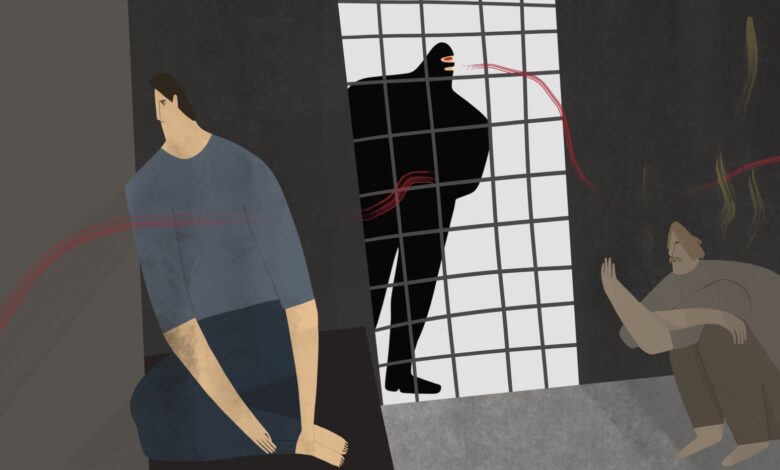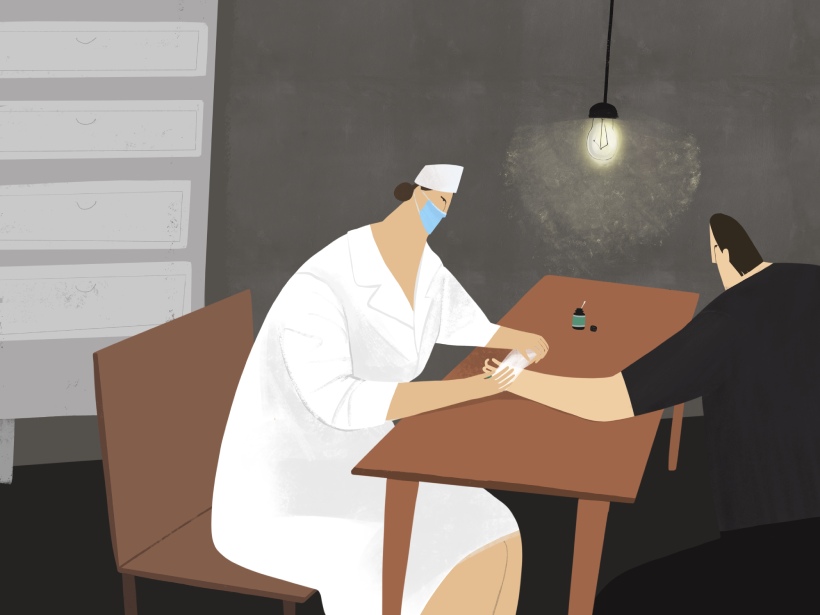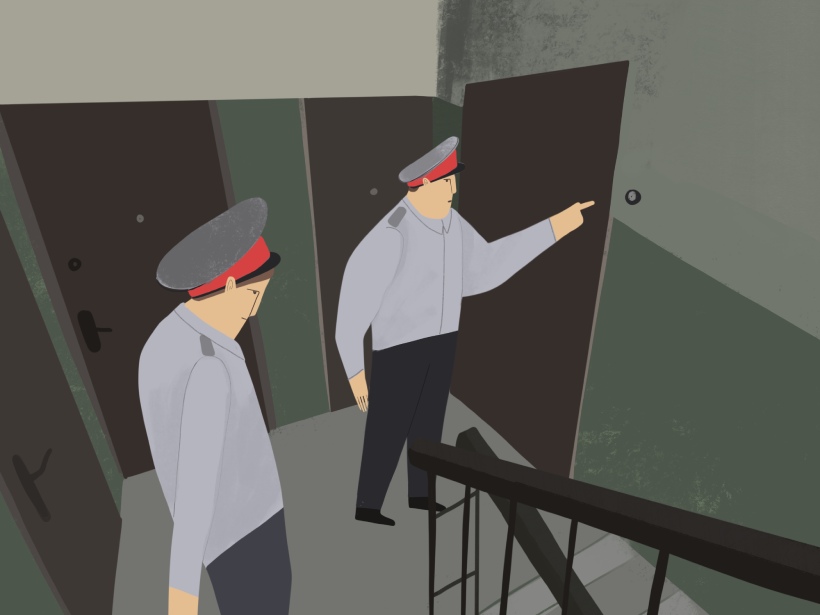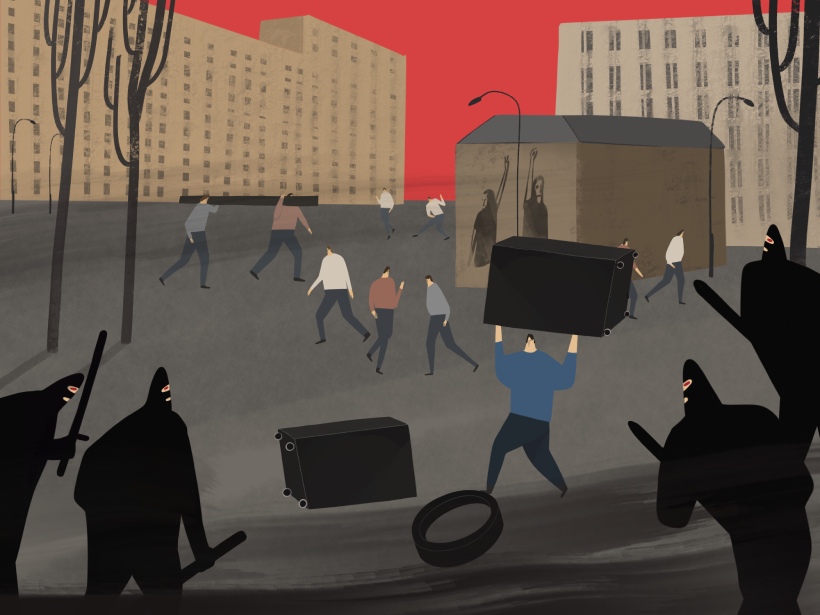Torture and abuse in 2020 – Aliaksei’s story

25 years old. “We cannot win without a fight, and the situation can’t be resolved peacefully anymore”
August 2020 was indeed a month of changes for Aliaksei. After the presidential election, he actively participated in protest demonstrations, and it was there that he met his girlfriend whom he has been dating since. Aliaksei was detained more than once. However, he serves his sentence not for going out to protest but for speaking out against a head of a small-town police department in a Telegram chatroom. The punishment for speaking out was severe: two years of home confinement with penal labor.
“Why did you tie those ribbons?”

“It’s important to note that around that time, in August, I met Alina, and she is my girlfriend now. We participated in protest rallies and tied ribbons as symbols of our peaceful pro-democracy movement in Minsk and a small town not far from Minsk. At the end of September, Alina, another young man, and I were detained. A senior lieutenant was constantly provoking and picking on me, but I held on because Alina was with me. Eventually, they let us go as they had no right to detain us for more than three hours. However, they seized a briefcase with ribbons and spray paint cans.
A police officer arrived the next morning and said that the police department chief had summoned us for a talk. I naively thought that if it was just a chat, then fine, I would go. The other young man was already sitting in the police car. They told me to call Alina and ask her to come too. I lied to them that she was at work and couldn’t leave for the time being. They called their supervisor to get some instructions. He said that we would be detained anyway, even if Alina did not show up voluntarily. They picked her up in the police car, and the three of us went to the police station.”
“We walked at the head of a protest column, Alina held an official Belarusian flag, and I displayed a white-red-white national flag. That must have been when they recorded a video of us“
“I was the first to be taken to the police chief, and Alina and the other guy were sent to the investigators. The conversation with the chief went well: we didn’t argue. He calmly asked questions: ‘Why did you tie those ribbons?’ Then he said that he had a video allegedly proving my participation in protest rallies. ‘We will have to detain you,’ he said. I recalled how the events unfolded: when we went to protest rallies in Dziarzhynsk [a town of about 27,000 people located approximately 40 kilometers southwest of Minsk], we walked at the head of a protest column, Alina held an official Belarusian flag, and I displayed a white-red-white national flag. That must have been when they recorded a video of us.”
At Aliaksei’s request, the police let Alina go home to her child, and he and the other young man were detained. At first, the police placed them in a “TV” cell – that’s what the regular cells were called at the police station. They wouldn’t let the men go to the bathroom. This, of course, annoyed Aliaksei and his acquaintance, and they did not hide their irritation. Having decided that this qualified as unruly behavior, police officers sent the two detainees to a temporary detention center and put them into separate cells.
“I was alone in the cell. The detention center staff offered mattresses, but I knew what their condition would be like and refused. I was sitting right on an iron bunk. I was just sitting and waiting.
It was already dark. I was exhausted and was able to fall asleep even in these conditions. At night, I heard the next cell’s door opening and closing periodically, and my acquaintance was repeatedly taken out of his cell and brought back in. They released us around 10 am. Before that, we went to see an investigator. He said that we got lucky and would be ‘forgiven’ since it was a first-time offense. He noted that the court would sentence me to a fine of no more than four base units (about $45 USD) for participating in a protest rally and that the other guy would get some light punishment just for hooliganism. We agreed as we wanted to get out of there as soon as possible. We signed papers consenting to our trial taking place in absentia.”
“It’s unlikely they will put you in jail, but an open prison is always an option”
After his first detention, Aliaksei did not stop participating in the protest demonstrations. Then the head of the Dziarzhynsk police department detained a whole family with children. The father was sentenced to administrative detention, and the other family members were released. Aliaksei couldn’t help but react to this. He expressed his opinion about the police chief in a well-known local Telegram chatroom.
“The word ‘faggot’ was the main trigger in my comment. One November day, two policemen came to see me at 7 am (I still lived with my parents then). They asked my mother if she had a SIM card registered under her name. Half-asleep, I came up to them and saw that piece of paper with my old Telegram username. I realized right away: that was it, I was so screwed.
I ran to find my cell phone. They yelled, ‘Stop!’ They took away my phone and showed me a search and detention warrant.
‘The SIM card is in your mother’s name. If you want, we can detain her.’
‘No. I was the one doing all this stuff, and that is my Telegram [username].’ I have an iPhone, and I realized that they wouldn’t be able to hack it. Besides, I wiped the data from my phone. I gave them the password. They looked through my phone, found nothing noteworthy, and took me away. I knew they had no right to detain me for more than 72 hours.”
Three days passed, and Aliaksei was released and told to wait for a trial.
We assume that many people would be interested in learning how security forces figured out Aliaksei’s identity. Aliaksei says that someone under a familiar username sent him a link, and Aliaksei clicked it. It was from this link that the security forces figured out his phone’s full IP address. It is worth being careful and exercising digital hygiene to avoid such cases.
“I talked to a lot of people, even former prosecutors. They told me it was unlikely I’d go to jail, but an open prison was always an option, yes. Celebrating New Year at home was my priority at the time. I’m glad that everything happened as I expected. The trial was scheduled for February, but the judge postponed the first court hearing. The reason was an injury I suffered before the three-day detention. While working with a circular saw, I accidentally cut off my left pinkie finger; it was stitched up. When in the temporary detention center, I needed daily bandage changes so the finger wouldn’t get infected. I was taken to the Dziarzhynsk health clinic on the first day. But the next day, when I asked for a new bandage, they told me to wait for a doctor. When I went in to see her, she said:
‘So, you are sober after all!’
‘What do you mean?’
‘Well, they called me in and asked to check on a drunk. I only have a solution of brilliant green [a topical antiseptic], not even hydrogen peroxide.'”
“She somehow managed to get the bandage off but ripped off a piece of flesh in the process. Then she treated the whole area with a solution of brilliant green”

“She didn’t know about me and my injury and was supposed to just change the bandage. She had no medical supplies to do that. She somehow managed to get the bandage off but ripped off a piece of flesh in the process. Then she treated the whole area with a solution of brilliant green. As they say, work with what you’ve got. After I left the detention center, pus was oozing from my finger. Thank God, other doctors took a look at it later and did everything right.
By the second court hearing, I had collected a lot of documents (including the paperwork on my injury) that could have helped my case. The documents were accepted, but they did not affect the verdict. I was under the impression that they were just thrown out. I was fined 3,000 Belarusian rubles (about $1,230 USD) as compensation for moral damages the police chief sustained and two years of home confinement with penal labor. Initially, the head of the Dziarzhynsk police department asked for 4,000 rubles and wanted me to apologize in the same chatroom where I insulted him. I thought, well, if that’s how you want to please yourself, be my guest. I got some help writing the apology: the text read that such a respected person as Sviatlana Tsikhanouskaya would have never said ‘such things’ about policemen. Even the judge was shocked by my eloquence. The amount I had to pay for moral damages was reduced.
I was also given 10 days to review and appeal the verdict, but I realized there was no point in doing anything. The laws in Belarus don’t work. Before the trial, I was given about 300 pages of materials on my case. And this was all about me? Because of one word in a Telegram chatroom? That was so funny. My phone was seized as a weapon used in the crime.”
“You are forgiven for the first offense, but the second time around, you will get at least 15 days of detention”

The period of home confinement with penal labor started. Aliaksei says he was registered with the local correctional service committee and given a set time when he was allowed to leave his home. He was allowed to be absent from his place during work hours, from 8:30 am to 5 pm. They also calculated the time it takes Aliaksei to get from home to work, which turned out to be about 30 minutes. Two more hours are added before and after work for him to be able to go to a store or pharmacy only. Going outside for a walk was prohibited. Aliaksei was not allowed to leave his home between 7:30 pm and 6 am. While serving their sentence, one is forbidden from visiting parents and going to other apartments and houses (for instance, a friend’s place), bars, clubs, and even coffee houses. The convicted are instructed to give the police advance notice of any family events.
Aliaksei says he is given “special” treatment. The police often decline his requests for permission to go somewhere, even though his acquaintances who serve similar sentences but not in politically motivated cases have their requests approved. Aliaksei goes to the police station every Friday and Sunday, and other people who had been detained under Article 23.34 of the Administrative Offenses Code since August 2020 also gather there.
“When I started serving my sentence, police didn’t come with checks for a long time. And then they showed up out of the blue. When my family got sick with the coronavirus, the police did not come. Perhaps, they let us relax a bit. Sometimes they come two or three times a day. On one occasion, they came at 1 am. Speaking of prohibitions, one is not allowed to drink alcoholic beverages, not even zero alcohol ones. They can call and order me to come to the police station anytime, and I have to do it.”
Everything was going well, and then Aliaksei received his first warning for violating the regime.
“My bad: I went outside to play ball with the kid for 10 minutes, and the police arrived and noticed this. I went to the police station the following day. The police chief said that I was forgiven as it was the first regime violation from my side, but the second time around, I would get at least 15 days of detention.”
“One day, we will meet again”
“I continued serving my sentence. On April 29, I went to the police chief’s office to request permission to attend the kid’s hip-hop competition. He said, ‘Okay, no problem, submit an application addressed to me.’ Alina and I went to my brother’s birthday party at 7 pm on April 30 without informing the police – that was my second mistake. I quickly gave him the gifts and called a cab around 7:25 pm. The drive home was literally three minutes, but the cab was a little late, and the police called me at 7:31 pm sharp and asked, ‘Where are you?’ The cab drove up to the apartment. They said I was 10 minutes late and that they would decide what to do with me the next day.”
The decision was unambiguous – Aliaksei got 15 days of detention. He was taken to the detention center. He couldn’t make it to the kid’s competition.
“I thought Alina would bring cigarettes on Monday, but I only got some personal belongings and hygiene products. So, no smoking.
‘Why am I not given a mattress?’
‘You are prohibited from having one.’
‘Prohibited why?’
‘Because you are here due to a regime violation, Article 55.’
Before we went to bed, we were told the detention center staff would wake us up every hour. They woke me up every hour on the hour between 10 pm and 6 am for the duration of my detention. I had to come up to the feeder [an opening in the door through which inmates are given food] to hear: ‘Are you awake? All right, go back to sleep.’ I was forbidden from sitting or lying on the bunk bed between 6 am and 10 pm. I could only sit on a small bench, and when the chief was absent, take a little nap on it.”
“Before we went to bed, we were told the detention center staff would wake us up every hour. They woke me up every hour on the hour between 10 pm and 6 am for the duration of my detention“
“Some detention center staff members would say things like, ‘Hey, you animal, you bastard!’ When tired of walking around my cell, I would sit down, and then a staff member would open the feeder and say:
‘Hey, motherf*cker, get up! Or I’ll beat the f*ck out of you!’
‘Go f*ck yourself!’
‘What? I’m going to find the chief now!’
‘Yeah, go ahead!’
‘I will ask for more detention days for you!’
‘Go for it, ask! Would this make you feel better? You can’t make this any worse for me. One day, we will meet again, and you’ll have a much harder time.’ He closed the feeder and left, not knowing how to answer me.”
Aliaksei had to sleep on bare iron for all 15 days of detention. He gave up smoking for this period. He tells us about jail food: they didn’t give him any tea, only porridge with no salt in the morning. The lunch was soup, a cutlet, and porridge again, and in the evening, they alternated between vinaigrette and coleslaw. You can think of it as a “special prevention diet”. The police, of course, did not forget about helping Aliaksei return to the “right ideological path”.
“They brought a small speaker and put on music on the first day. The playlist consisted of seven tracks: the first was the anthem of Belarus, and the rest were about how bad it was to attend protest rallies. Can you imagine that songs like that exist? The first eight days were hard because I was alone in this depressing atmosphere. But then a drunkard from a local village was moved to my cell. I gave him a soap bar and asked him to have a wash. The things in the cell got better. And I finally had someone to talk to. The most interesting thing is that he was first brought in with a blanket, but the police took the blanket away by the end of the day, so we were in the same conditions. Before his transfer to my cell, he had already served eight days with all the ‘amenities’ in a nearby cell, and he didn’t know why he had been transferred. They did not wake him up at night. However, he was also forbidden from smoking but seemed to have taken it in stride. A bottle [of alcohol] he had hidden at home was the only thing he cared about.”
Aliaksei says that a man in his fifties was transferred to his cell one day before his release. The man supported the pro-democracy movement but wasn’t an active participant. The following happened at his dacha [a seasonal or year-round country cottage]: a conflict arose between him and another man over a van blocking people’s passage to a lake. The two men often argued and had petty fights in their vegetable gardens. So, the other man, knowing the political views of his rival, decided to take revenge and filed a complaint with the police regarding his neighbor’s political stance.
“The man said the police came to search his place the following day, seized his phone, and found an official Belarusian flag. Too bad the latter didn’t save him from detention. A week later, he was told to come to retrieve his phone. But before he reached the police station, traffic cops stopped him and started bugging him about his license plate without even checking his documents. But nothing ‘criminal’ was found either. Eventually, he was charged with subscribing to the NEXTA Telegram channel and sentenced to three days of detention. They confiscated this phone, menacingly declaring it an ‘instrument of crime’.”
“I am getting used to this new reality”
Aliaksei was released from the temporary detention center on Sunday and immediately went to check in at the police station. He had to go to work the next day. It took him a few more days to start sleeping normally at home, and he experienced a constant feeling of anxiety.
On May 9, the warden of the detention center gathered everyone charged under Article 23.34 of the Administrative Offenses Code and started giving another propaganda lecture. But first, he said there was a guy he helped and always treated well. He said something to the effect of “this guy screwed up, and he [the detention center warden] had to answer to the superiors for that”. Eventually, the guy in question received 15 days of administrative detention. The warden was clearly referring to Aliaksei. And it was all said to perpetuate the idea that one should not read and write anything in Telegram channels and chatrooms.
“I am getting used to this new reality. I can’t say it is too tough. I have a lot of support from Alina. I am very grateful to her for that. I know it’s not easy with my fines and detentions, but she understands me. I didn’t regret what I had done one bit. And I am happy I met such a wonderful woman during the protests.”
When people spotted law enforcers, they started yelling, “Riot police! Let’s scram!” And this one guy shouted: “Raman didn’t run away!” I felt goosebumps running all over my body

We ask Aliaksei what helps him hold it all together, what inspires him, how he sees the future, and whether he thinks about moving abroad. He tells us about one episode.
“There is one incident that sticks in my mind. People gathered near a make-shift memorial to Raman Bandarenka [an aspiring Belarusian designer and shop manager who died after reportedly being beaten by security forces]. There was a young man whose words I will probably never forget. When people spotted law enforcers, they started yelling, ‘Riot police! Let’s scram!’ And this guy shouted: ‘Raman did not run away!’ I felt goosebumps running all over my body. The crowd stopped for a second, but then people saw a lot of riot policemen approaching and rushed away. Yet, this guy did not give up: he started bringing trash cans and putting them up as barricades. Everyone was telling him, ‘What are you doing? Take it away, don’t! Let’s go!’ But I agreed with him and thought, ‘You are good!’ What do I think? We cannot win without a fight, and the situation can’t be resolved peacefully anymore.
I will leave the country as soon as an opportunity arises. I want freedom. I would like to keep fighting, but the pro-democracy movement is non-existent in Belarus now, and it is extremely frustrating. If there had been anything going on, I would have stayed in Belarus.”
P.S. Aliaksei continues to serve his sentence of home confinement with penal labor.
Author: August2020 project team
Illustrations: August2020 project team
